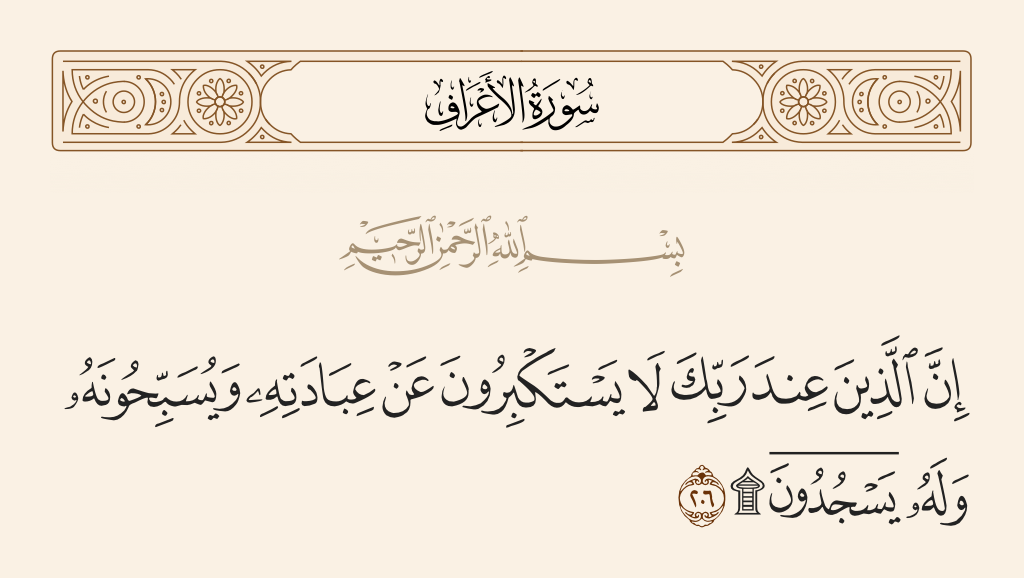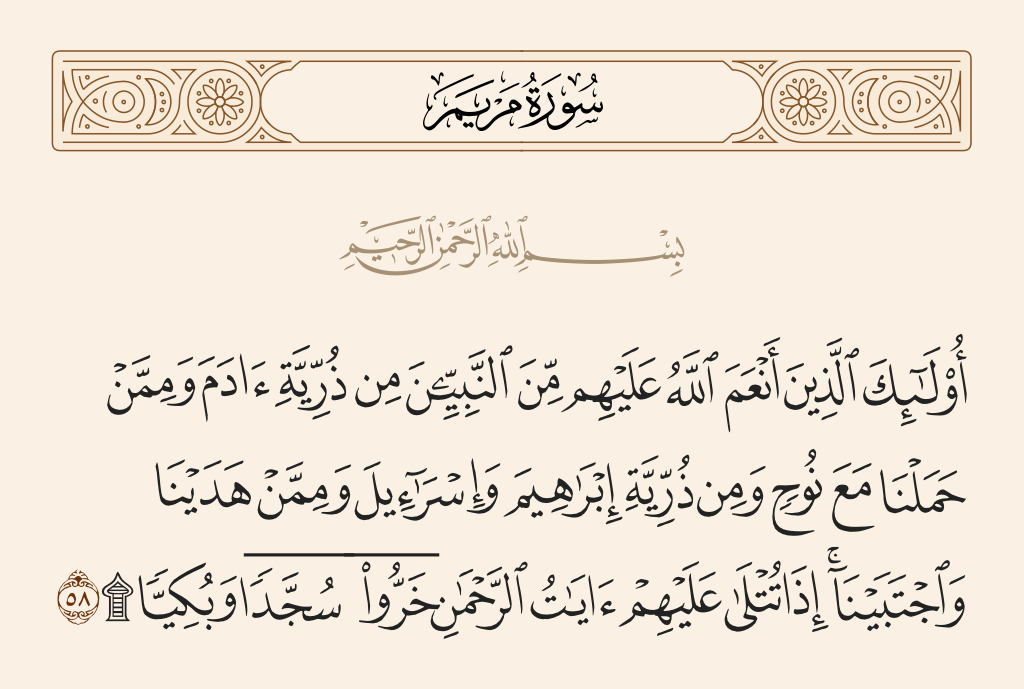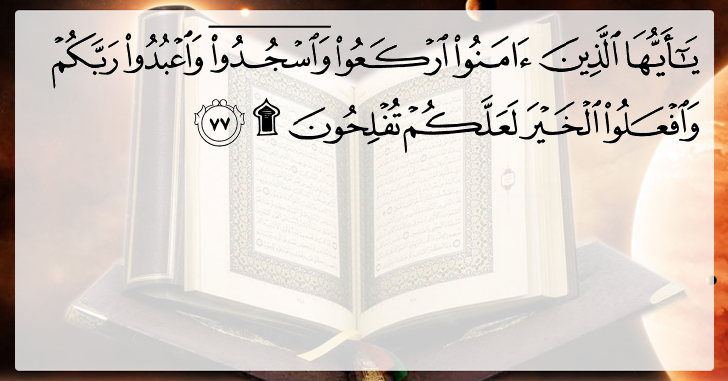Sure, here are the Sajdah (prostration) verses in the Quran presented in a table format:
| Surah | Verse | Sajdah Number |
|---|---|---|
| Al-A’raf | 7:206 | 1 |
| Ar-Ra’d | 13:15 | 2 |
| An-Nahl | 16:26 | 3 |
| Al-Isra | 17:109 | 4 |
| Maryam | 19:58 | 5 |
| Al-Hajj | 22:18 | 6 |
| Al-Hajj | 22:77 | 7 |
| Al-Furqan | 25:60 | 8 |
| An-Naml | 27:26 | 9 |
| As-Sajdah | 32:15 | 10 |
| Sad | 38:24 | 11 |
| Fussilat | 41:38 | 12 |
| An-Najm | 53:62 | 13 |
| Al-Inshiqaq | 84:21 | 14 |
These verses are known in the Quran for being special, and when read or heard, Muslims perform a prostration of thanks or in worship.
This is verse 206 in chapter 7 of Holy Quran.
إن الذين عند ربك لا يستكبرون عن عبادته ويسبحونه وله يسجدون
Translation: “Indeed, those who are near your Lord are not too proud to worship Him; they exalt Him and to Him they prostrate.”
This verse gives a description of the righteous servants near Allah. It brings out their humility and devotion in the ways of worship. They were never too proud or arrogant to worship Allah, glorifying and praising Him, prostrating themselves. That verse portrays the virtue of humility and sincerity in worship because a true believer will admit his dependence on and devotion to Allah by prostrating before Him in all acts of worship.

Surah Ar-Ra’d (13:15):
وَلِلَّهِ يَسۡجُدُ مَن فِي ٱلسَّمَـٰوَٰتِ وَٱلۡأَرۡضِ طَوۡعًۭا وَكَرۡهًۭا وَظِلَـٰلُهُم بِٱلۡغُدُوِّ وَٱلۡءَاصَالِ
Translation: “And to Allah prostrates whoever is within the heavens and the earth, willingly or by compulsion, and their shadows [as well] in the mornings and the afternoons.”
This verse spells out the universal submission to Allah, the Creator. It enables one to understand that everything in the heavens and on the earth surrenders its will, whether willingly or by force of compulsion. Shadows in the morning and afternoon bow down to Allah’s will. This verse reminds one of the fact that Allah is ultimately sovereign and has authority over all of His creations.
Indeed, the verse from Surah An-Nahl, verse 16, of the Quran reads as follows:
Surah An-Nahl, Verse 16:
إِنَّ ٱلَّذِينَ هُم مِّنۢ بِكَآءٖ رَّبِّهِمۡ لَمُشۡفِقُونَ
“Indeed, those who are apprehensive from the fear of their Lord.”
Description of those that are God-conscious and fearful towards their Lord: They are a people to whom the power, might, and decision of Allah create a feeling of deep reverence and awe. Because of this fear of displeasing Allah, they are cautious and keep watch over their actions, holding on fast to the commandments of Allah, aloof from evil deeds. This verse lays the most emphasis on the creation of God-fear and humility before Allah.
Certainly, here is the verse from Surah Al-Isra (17:109) of the Quran:
Surah Al-Isra (17:109):
وَيَسۡجُدُونَ لِلَّهِ مَا فِي ٱلسَّمَـٰوَٰتِ وَٱلۡأَرۡضِ وَطَآئِرُ ٱلۡجَنَّةِ وَٱلۡمَلَـٰٓئِكَةُ وَهُمۡ لَا يَسۡتَكۡبِرُونَ
Translation: “And they prostrate to Allah, who is in the heavens and the earth, willingly or by compulsion, and their shadows [as well] in the mornings and the afternoons.”
The verse is supposed to grab the realization of universal subordination to the Creator, Allah—exclaiming that whatever is on the heavens and earth, even including the dwellers of Paradise—that is, the birds—prostrate themselves to Allah. It means everything in the creation is made to realize the sovereignty and rule of Allah, whether willingly or by force. This verse reminds every creature of ultimate humility and submission due to Allah.
For certain, here is the verse from Surah Maryam (19:58) of the Quran:
Check Out : QURAN PAR SHAYARI IN URDU | 2024
Surah Maryam (19:58):
أُوْلَـٰٓئِكَ ٱلَّذِينَ أَنۡعَمَ ٱللَّهُ عَلَيۡه

Those were they upon whom Allah bestowed favors, from among the prophets, of the seed of Adam, and of those whom We carried with Nuh, and of the seed of Ibrahim and Israil, and of those whom We guided and chose. Then when the messages of the Beneficent were recited to them, they fell down prostrating and weeping.
This verse draws the description of those Allah has chosen from among the prophets and their offspring. When they hear the signs of the Most Merciful, they fall down facing the earth, prostrating and weeping, in humility and appreciation. This is how far humility will be shown by the righteous in the face of the signs of Allah’s mercy and guidance. It is an indication or moral lesson that one ought to have humility and devotion in relation to divine guidance.
Certainly, here is the verse from Surah Al-Hajj (22:18) of the Quran:
Surah Al-Hajj (22:18):
ألم تر أن الله يسجد له من في السماوات ومن في الأرض والشمس والقمر والنجوم والجبال والشجر والدواب وكثير
Can you not see that to Allah bow down in worship all things that are in the heavens and on earth, the sun, the moon, the stars, the mountains, the trees, the animals and a great number among mankind? But many are those for whom punishment is rightly due. Anyone Allah debases, there is none who can give him honour. For Allah carries out all that He wills.”
This verse explains the general submission to Allah, the Creator; it underlines the fact that everything within the heavens and the earth, including heavenly bodies, natural elements, and all living things, prostrates itself to Him. It portrays a clear assertion of Allah’s dominion and authority over all creation and the thin, humbling position given to man in the overall view of existence. The verse cautions against arrogance and stiff-neckedness: for Allah is capable of abasing one who opposes the Divine Will, after all. In essence, it is to say that Allah has complete control over what He creates and does as He pleases.
Indeed, the same is the verse of Surah Al-Hajj(22:77) in the Quran:

Surah Al-Hajj (22:77):
يا أيها الذين ءامنوا اركعوا وٱسجدوا وٱعبدوا ربَّكم وافعلوا ٱلخيـر لعلّكم تفلحون
Translation: “O you who have believed, bow and prostrate and worship your Lord and do good – that you may succeed.”
Explanation: The believers are commanded to bow and prostrate as an. It emphasizes the need to keep this promise in prayer and acts of righteousness (goodness) that contributes to one’s welfare in both lives. The verse gives them the onus to seek no less than the best in what is done for His worship and manner in order to derive a blessed and prosperous life from Allah.
Yes, this is the verse from the Quran in Surah Al-Furqan (25:60):
Surah Al-Furqan (25:60):
وَإِذَا قِيلَ لَهُمُ ٱسۡجُدُواْ لِلرَّحۡمَـٰنِ قَالُواْ وَمَا ٱلرَّحۡمَـٰنُ أَنَسۡجُدُ لِمَا تَأۡمُرُنَا وَزَادَهُمۡ نُفُورٗا
Translation: “And when it is said to them, ‘Prostrate to the Most Merciful,’ they say, ‘And what is the Most Merciful? Should we prostrate to that which you order us?’ And it increases them in aversion.”
Explanation: This verse describes the response of the disbelievers when they are instructed to prostrate to Allah, the Most Merciful. They mockingly ask, “God have mercy, and protect us.:” and when admonished to obey His commands they say, “What. Would God guide those you send astray?” On the contrary the unfaithful do nothing but increase in their trespasses of disobedience against their Lord and in their defiance of Him. The verse is teaching that one should not get arrogant and reject the clear authority of Allah; definitely.
Here is the verse from Surah An-Naml (27:26) of the Quran:
Surah Al Naml (27:26):
إِنَّ ٱللَّهَ يُمۡسِكُ ٱلسَّمَـٰوَٰتِ وَٱلۡأَرۡضَۚ إِن يَزُولَآ إِن يَزُولَآ إِلَّا بِإِذۡنِهِۦۚ إِنَّهُۥ كَانَ حَلِيمٗا غَفُورٗا
Translation: “Indeed, Allah holds the heavens and the earth, lest they cease. And if they should cease, no one could hold them [in place] after Him. Indeed, He is Forbearing and Forgiving.”
Explanation: This verse emphasizes the sovereignty and power of Allah over the heavens and the earth. It stresses that it is Allah who holds and keeps in order the stability of the universe. If He were to cast them loose, none would then hold them in place. If Allah has absolute authority, then He is forbearing and forgiving, showing through this His mercy and compassion toward His creation. This verse reminds us of the control Allah has over all things and of His mercy towards His servants.
Surely this is the verse from Surah As-Sajdah (32:15) of The Quran:
Surah As-Sajdah (32:15):
أَمَّن كَانَ مَيۡتٗا فَأَحۡيَيۡنَـٰهُ وَجَعَلۡنَا لَ
Translation: “Is one who was dead and We gave him life and made for him light by which to walk among the people like one who is in darkness, never to emerge therefrom? Thus it has been made pleasing to the disbelievers that which they were doing.”
Exegesis: The whole verse, which contains a vigorous analogy that describes the contrast between the spiritually alive who are guided by the light of faith, and the spiritually dead, who are spread out in darkness. As the meaning of the verse reflects, the metaphorical raising up from spiritual death to life by Allah’s guidance sheds light on the path, and He is placing that one above the people in his light, while the others remain in a darkness that never shifts away from them. The verse is just sarin gas drowning in contrasts between the two groups, the believers and disbelievers, thus carving the importance of the guidance and faith that decides the spiritual status of the character finally.
Certainly, here is the verse from Surah Sad (38:24) of the Quran:
Surah Sad (38:24):
إِنَّ هَـٰذَآ أَخِي لَهُۥ تِسۡعٌۭ وَتِسۡعُونَ نَعۡقَةٗ وَلِيَ نَعۡقَةٞ وَٱحِدَةٞ فَقَـٰلَ أَكۡفِلۡنِيهَا وَعَزَّنِي فِي ٱلۡخِطَابِ
Translation: “Indeed, this, my brother, has ninety-nine ewes, and I have one ewe; so he said, ‘Entrust her to me,’ and he overpowered me in speech.”
Explanation: Surely, this is a narrative of the past concerning the Prophet David, son of Jessée, peace be upon him. It tells about his judgment between two disputing parties: one of them had 99 sheep, and the other one owned just one sheep. There were hundreds of sheep for one man, and he still asked for that one sheep of his fellow man to make it a hundred, so it felt pressed upon and oppressed. This verse speaks of the Prophet David acting as a just judge; fair dealing and equity in resolving disputes are seen at the helm. It is also a lesson in the use of persuasive speech along with the abuse of power.
Yes, it’s that verse—Surah Fussilat (41:38) in the Quran:
Surah Fussilat (41:38):
فَإِنِ ٱسۡتَكۡبَرُواْ فَٱلَّذِينَ عِندَ
So let them be; boasting on, they are pleased with themselves, and leave those by night day and they do not become tired.”
Explanation: This verse addresses those arrogant disbelievers who find arrogance in the teachings of Islam. In return for their arrogance, while the chosen slaves of Allah remain very busy glorifying and praising Him day and night without getting tired. It contrasts the arrogance of the disbelievers and the humility and devotion of the believers. It reminds: however hapless the attitude and behavior of man, worship and devotion, if it is to be sincere, can be devoted to Allah alone.
Yes, this is the verse:
Surah An-Najm (53:62):
ﭽ ﮅ ﮆ ﮇ ﮈ ﮉ ﮊ ﮋ ﮌ ﮍ ﮎ ﮏ ﮐ ﮑ ﮒ ﮓ ﮔ ﮕ ﮖ ﮗ ﮘ ﮙ
Translation: “So leave them to converse vainly and amuse themselves until they meet their Day which they are promised.”
Explanation: This is again part of the conclusion of Surah An-Najm, where it addresses the disbelievers. Surah An-Najm talks about the disbelievers who have rejected the message of the Prophet Muhammad (peace be upon him). The verse essentially guides the Prophet and the believers to step aside from the disbelievers’ vain talk and make the best of their amusement until the day of judgment, when they will receive the recompense of their disbelief. The verse emphasizes trust in Allah and his truth on the believers, even when facing opposition and mockery by the disbelievers. This verse reminds all of the time when each of them will be brought before Allah to account for their belief and actions.
Check Out : DUA FOR STUDYING | 2024
No doubt, here is the verse from Surah Al-Inshiqaq, Verse 84:21 of the Holy Quran:
Surah Al-Inshiqaq (84:21):
وَإِذَا قُرِئَ عَلَيۡهِمُ ٱلۡقُرۡءَانُ لَا يَسۡجُدُو
This verse focuses on the response of disbelievers to the Qur’an, through which they never get humbled and prostrate to Allah, although such profound guidance and the truth is embalmed in the Qur’an. In this way, it is a symbol of their rejection of faith and arrogance toward the message of Allah. This gives weight to the reminder of practicing humility and submission to Allah’s guidance, and of the consequences that befall someone who does not take his sign and revelations seriously.

AoA, my name is Abd al-Rahman, and my vision is to spread the knowledge of the Quran to everyone. I am proud and tall while standing as your trusted mentor on the journey of learning and memorizing the Holy Quran. I, along with a committed team of Islamic teachers, am bound to provide an easy online facility for Islamic studies and Hifz programs.
